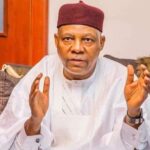The distribution of rice and grains by elected representatives in Nigeria has become a topic of concern and controversy. Allegations of corruption and mismanagement of public funds have plagued the political atmosphere, with one member confessing that the Presidential Budget and Advisory Team directed the Federal Ministry of Agriculture to distribute rice and grains to each House of Representatives member and senator for distribution in their constituencies.
The sheer amount of money spent on individual benefits for the National Assembly members, coupled with the lack of transparency in the distribution process, raises serious concerns. According to the confessions, the House of Representatives members would have received a total of N36 billion worth of rice and grains, while the senators received N21.8 billion worth. This amounts to a staggering N57.8 billion worth of foodstuffs for distribution across the country.
The first question that arises from this revelation is whether these claims are true and if these items were actually distributed to the constituencies. Transparency and accountability are vital in ensuring that public funds are utilised for the benefit of the people. If these allegations are proved to be true, it raises serious concerns about the misuse of public funds and the lack of oversight in the distribution process.
Furthermore, when we consider the exorbitant amounts spent on elected representatives, it is important to question whether these expenses are justified, especially considering the pressing needs of the country. In just seven months of the administration, N132.84 billion was spent on the 469 National Assembly members. These numbers highlight the exorbitant amounts being spent on personal benefits, while vital sectors such as agriculture, education, healthcare, and water supply are in dire need of investment.
- Reinstate dissolved varsities’ governing councils, CSOs tell Tinubu
- Kukah centre urges churches to participate in politics, promote democracy
The implications of these expenditures become even more apparent when we analyse the individual benefits received by the House of Representatives members and senators. Each House of Representatives member received N260 million in just seven months, equivalent to N37,142,858 per month, excluding their salaries and other allowances. Similarly, each senator received N360 million in the same period, amounting to N51,428,572 per month, excluding their salaries and other allowances.
The staggering amount of N132.84 billion spent on the 469 National Assembly members in just seven months raises concerns about the missed opportunities to invest in vital sectors. These funds, if utilised judiciously, could have significantly impacted the agriculture value chain, addressed the issue of out-of-school children, improved healthcare delivery, and tackled drug-related menaces.
It is disheartening to see such vast amounts of money being spent on personal benefits, while the country continues to grapple with numerous challenges.
Considering the challenging economic hardships and security issues facing the country, the allocation of such a large sum of money to the members of the National Assembly raises widespread anger over the welfare of the people they are elected to represent.
It is time to stand up against these types of leaders and demand that they show real commitment to reducing youth unemployment, insecurity, and poverty. Nigeria needs leaders who are dedicated to solving basic socio-cultural problems, addressing the regressing economy, and securing a better future for all.
The current state of affairs in Nigeria is a result of leaders who are poorly prepared and ill-equipped to lead, except for their ambitions for power and wealth. The people are left at the mercy of armed crime, unforgivable poverty, and derision from other parts of Africa and the world.
Nigerians must work to replace these leaders who think power is an end in itself; who mobilise the people only during elections, sowing seeds of division and leaving everyone poorer and more insecure than they were. It is time for a more credible and cultured elite to join politics and make a difference. We need leaders who will educate the children of the poor, bring peace to communities, stop corruption, and end insecurity.
A new generation of Nigerian elite must emerge from this mess. We must build strong economics and enterprising people, and empower the youth to grow with pride and faith in a better future. It is time to resist the temptation to live in perpetual blame of past leaders and instead focus on building a strong foundation for a brighter future.
Abdul-Azeez Suleiman is the Spokesperson for the Northern Elders Forum.
 Join Daily Trust WhatsApp Community For Quick Access To News and Happenings Around You.
Join Daily Trust WhatsApp Community For Quick Access To News and Happenings Around You.